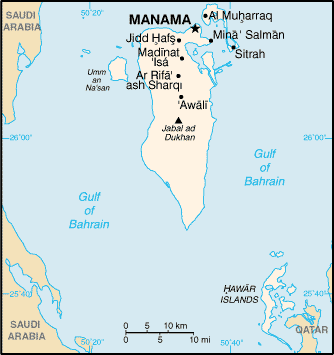Map:

Overview:
Bahrain's small size and central location among Persian Gulf countries require it to play a delicate balancing act in foreign affairs among its larger neighbors. Facing declining oil reserves, Bahrain has turned to petroleum processing and refining and has transformed itself into an international banking center. The new amir, installed in 1999, has pushed economic and political reforms and has worked to improve relations with the Shi'a community. In February 2001, Bahraini voters approved a referendum on the National Action Charter - the centerpiece of the amir's political liberalization program. In February 2002, Amir HAMAD bin Isa Al Khalifa proclaimed himself king. In October 2002, Bahrainis elected members of the lower house of Bahrain's reconstituted bicameral legislature, the National Assembly.
The People:
Population: 688,345
note: includes 235,108 non-nationals (July 2005 est.)
Age structure: 0-14 years: 27.8% (male 96,807/female 94,863)
15-64 years: 68.7% (male 275,792/female 197,424)
65 years and over: 3.4% (male 12,078/female 11,381) (2005 est.)
Religions:
Muslim (Shi'a and Sunni) 81.2%, Christian 9%, other 9.8% (2001 census)
Government Type:
constitutional hereditary monarchy
Leader(s) to pray for:
chief of state: King HAMAD bin Isa Al Khalifa (since 6 March 1999); Heir Apparent Crown Prince SALMAN bin Hamad (son of the monarch, born 21 October 1969)
head of government: Prime Minister KHALIFA bin Salman Al Khalifa (since NA 1971)
Source: The World Factbook
View All Countries